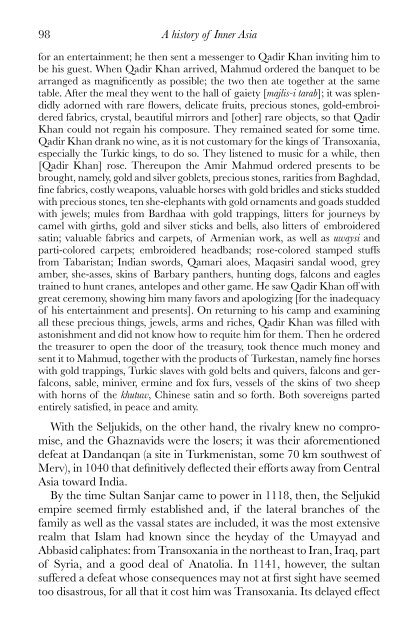You also want an ePaper? Increase the reach of your titles
YUMPU automatically turns print PDFs into web optimized ePapers that Google loves.
98 A history of Inner Asia<br />
for an entertainment; he then sent a messenger to Qadir Khan inviting him to<br />
be his guest.When Qadir Khan arrived, Mahmud ordered the banquet to be<br />
arranged as magnificently as possible; the two then ate together at the same<br />
table.After the meal they went to the hall of gaiety [majlis-i tarab]; it was splendidly<br />
adorned with rare flowers, delicate fruits, precious stones, gold-embroidered<br />
fabrics, crystal, beautiful mirrors and [other] rare objects, so that Qadir<br />
Khan could not regain his composure.They remained seated for some time.<br />
Qadir Khan drank no wine, as it is not customary for the kings of Transoxania,<br />
especially the Turkic kings, to do so.They listened to music for a while, then<br />
[Qadir Khan] rose.Thereupon the Amir Mahmud ordered presents to be<br />
brought, namely, gold and silver goblets, precious stones, rarities from Baghdad,<br />
fine fabrics, costly weapons, valuable horses with gold bridles and sticks studded<br />
with precious stones, ten she-elephants with gold ornaments and goads studded<br />
with jewels; mules from Bardhaa with gold trappings, litters for journeys by<br />
camel with girths, gold and silver sticks and bells, also litters of embroidered<br />
satin; valuable fabrics and carpets, of Armenian work, as well as uwaysi and<br />
parti-colored carpets; embroidered headbands; rose-colored stamped stuffs<br />
from Tabaristan; Indian swords, Qamari aloes, Maqasiri sandal wood, grey<br />
amber, she-asses, skins of Barbary panthers, hunting dogs, falcons and eagles<br />
trained to hunt cranes, antelopes and other game.He saw Qadir Khan off with<br />
great ceremony, showing him many favors and apologizing [for the inadequacy<br />
of his entertainment and presents].On returning to his camp and examining<br />
all these precious things, jewels, arms and riches, Qadir Khan was filled with<br />
astonishment and did not know how to requite him for them.Then he ordered<br />
the treasurer to open the door of the treasury, took thence much money and<br />
sent it to Mahmud, together with the products of Turkestan, namely fine horses<br />
with gold trappings, Turkic slaves with gold belts and quivers, falcons and gerfalcons,<br />
sable, miniver, ermine and fox furs, vessels of the skins of two sheep<br />
with horns of the khutuw, Chinese satin and so forth.Both sovereigns parted<br />
entirely satisfied, in peace and amity.<br />
With the Seljukids, on the other hand, the rivalry knew no compromise,<br />
and the Ghaznavids were the losers; it was their aforementioned<br />
defeat at Dandanqan (a site in Turkmenistan, some 70 km southwest of<br />
Merv), in 1040 that definitively deflected their efforts away from Central<br />
Asia toward India.<br />
By the time Sultan Sanjar came to power in 1118, then, the Seljukid<br />
empire seemed firmly established and, if the lateral branches of the<br />
family as well as the vassal states are included, it was the most extensive<br />
realm that Islam had known since the heyday of the Umayyad and<br />
Abbasid caliphates: from Transoxania in the northeast to Iran, Iraq, part<br />
of Syria, and a good deal of Anatolia.In 1141, however, the sultan<br />
suffered a defeat whose consequences may not at first sight have seemed<br />
too disastrous, for all that it cost him was Transoxania.Its delayed effect
















